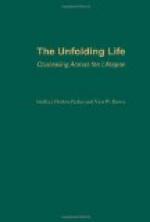IMAGINATION
The child is not content alone to imitate activities. He likes to transform objects and make over familiar situations. This he does through that power of his soul called imagination.
The imagination of this period is “fancy-full,” crude, and unbridled by reason or will. The child lives in a world of make believe. He sees whole menageries in the back yard, and performs exploits worthy of a David or Samson. He gives soul to inanimate objects, and endows them with feelings like his own. He plays with companions of his own creation, and peoples the dark with weird forms. Things are changed at will to suit his whims, the stick becoming the untamed steed and the rocking chair the storm-tossed boat. The magic of his alchemy may extend to himself, and make him for days another person, or even an animal.
This world of make believe is as real to him as the world which is seen through his eyes, and often he can not distinguish between the two. Many a little heart has quivered over the punishment inflicted for “lying”, when willful misrepresentation was not in his thoughts. However, harsh treatment of a vivid imagination may result in real deception later on, for the child can not help “seeing things,” too wonderful to be enjoyed alone, and then, perforce, there must be deliberate planning to escape the punishment.
This harshness also begins to raise an invisible barrier between the child and parent. It was felt by a little maiden of rare fancy, who said in a whisper at the conclusion of one of these marvellous tales, “But don’t tell Mamma.” The impassable wall between many a mother and daughter in later years, once consisted of but a scattered stone here and there.
Passing by the play life of the child where the imagination has fullest scope, the question arises as to the meaning of this power in character building. One purpose stands paramount over every other. It is the “ideal making factory” of the life. From transforming sticks and chairs, the soul will one day pass to transforming memories and thoughts, putting away the unattractive features and investing the attractive with even more charm, through dreams of what might be. From constructing houses out of blocks, the soul will begin to construct ideals out of its experiences and visions, according to a pattern shown on some mount.
As childhood recedes and manhood beckons, the soul unveils this ideal, fashioned in its secret workshop out of all that appeared most desirable, and with strange, magnetic power, it begins to draw the life after it. Worthy or unworthy, the years to come will see some part, at least, of the ideal, a reality. The character of the imagination, therefore, becomes a matter of supreme concern to nurture. It will be healthy or diseased morally, according to the quality of the material supplied for its use. The two great sources of this material are every day experiences and the story. The meaning of these experiences to the child’s life has already been emphasized in various connections, and repetition is unnecessary, but the story holds a unique place in point of influence. Since it comes with deepest significance to the child in the next period of development, when imagination is less mixed with fancy, its discussion will be reserved for that time.




